
THE STAINLESS STEEL CAREER OF AUTHOR HARRY HARRISON
By JEFF GOLDSMITH
Take a walk into your favorite local bookstore, make a beeline for the back of the store and you'll surely locate the science fiction section. If you can manage the long haul past all of the STAR TREK, STAR WARS, DR. WHO and X-FILES tie-in books, you'll find a rapidly shrinking shelf which contains works of science fiction which happen to be completely and utterly original!
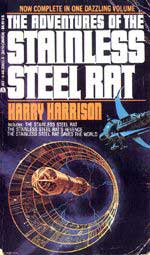 If you were to take a closer look into this section, you'd notice the recurring name of one Mr. Harry Harrison.
If you were to take a closer look into this section, you'd notice the recurring name of one Mr. Harry Harrison.
This prolific writer's works have won him The Nebula, The Prix Jules Verne, and the Premio Italia awards. He's written countless short stories and has just had his 42nd book hit the stands here in the states, entitled, STARS AND STRIPES FOREVER!
Many of you probably recognize Harry for his darkly prophetic tome, MAKE ROOM! MAKE ROOM!, which became the basis of the 70s cult film, SOYLENT GREEN with Charleton Heston. Of course, Harry is also responsible for the ever popular and continually growing STAINLESS STEEL RAT series of books. But, how does this veteran fit into the big picture of sci-fi glory? To fully appreciate and understand that, we'll have to take a look back into the history of the sci-fi movement itself.
Science fiction as a literary movement is barely over 130 years old. The classical works of Jules Verne, Mary Shelly and H.G. Wells gained immense readership in their day. In 1902 the genre gained heightened attention with Georges Melies's 21 minute ground breaking film A TRIP TO THE MOON. This film was loosely based on ideas of both Verne and Wells and was the first sci-fi film. You've undoubtedly seen clips of it, as it's become one of the more recognizable icons of this century. (It's that silly pie-faced man in the moon who takes the rocket ship in the eye.)
Fast forward 23 years after all this hoopla and witness the first near funeral for the sci-fi movement. Due to a lack of any major new works, public interest had severely begun to fizzle and the future of the genre was uncertain.
However 1926 proved to be the year that saved sci-fi. The first big budget, sci-fi epic hit the screen; Fritz Lang's bold 187 minute film METROPOLIS. Meanwhile on the page, the first sci-fi pulp magazine, Hugo Gernsback's AMAZING STORIES hit the newsstands. This event recaptured the splendor of Jules Verne's day by revitalizing the serialized science fiction short story.
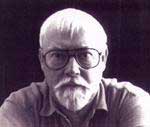 These concurrent events set the stage for 1932, which marked the year in which the world read and lauded Aldous Huxley's BRAVE NEW WORLD, one of the first full length science fiction novels to recieve acclaim since H.G. Wells passing. It brought readers back into the fold of the science fiction novel and reopened the passage for more works to follow. Yet, for some reason, few major works did follow and the movement for the most part fell into a long cycle of living in the pulps. Again, a dark future loomed as the sci-fi movement began to sink into the murkier existence usually reserved for mediocre murder mysteries . Thus a new mystery surfaced: Would science fiction literature ever get its break?
These concurrent events set the stage for 1932, which marked the year in which the world read and lauded Aldous Huxley's BRAVE NEW WORLD, one of the first full length science fiction novels to recieve acclaim since H.G. Wells passing. It brought readers back into the fold of the science fiction novel and reopened the passage for more works to follow. Yet, for some reason, few major works did follow and the movement for the most part fell into a long cycle of living in the pulps. Again, a dark future loomed as the sci-fi movement began to sink into the murkier existence usually reserved for mediocre murder mysteries . Thus a new mystery surfaced: Would science fiction literature ever get its break?
I'd like to cite March 12, 1925 as an event that helped give sci-fi the break it needed to make it through this century. That date marked the day on which Harry Harrison booked a one-way ticket to earth and arrived here for an indefinite stay. I say this because it was Harry and his generation of writers who bombasted the bookshelves with many of the now revered classics of the 50's and 60's. Their works essentially dragged the format out of the pulps by engaging many of the pulp publishers to become book publishers, which ultimately birthed the era of the popular sci-fi novel. It was during this era that enough work existed to finally add a science fiction section to your local bookstore.
So, now that you know a bit more about how Harry fits into the history of the science fiction literary movement, let's hear from the man himself during part one of our Harrison interview.
"During my youth, in Queens, NYC, one of my biggest interests was staying alive", Harry recounts. "Remember these were the depression days."
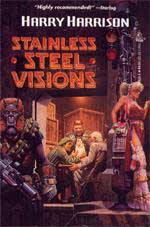 While Harry enjoyed his model airplanes as a kid, he quickly took suit to a cheaper and broader based hobby involving his free library card. "I'd read anything, maybe 15 books a week from the library and all the pulp magazine, in particular the science fiction magazines," he adds. "I was a sci-fi fan from the age of ten and one of the co-founders of the Queens Science Fiction League."
While Harry enjoyed his model airplanes as a kid, he quickly took suit to a cheaper and broader based hobby involving his free library card. "I'd read anything, maybe 15 books a week from the library and all the pulp magazine, in particular the science fiction magazines," he adds. "I was a sci-fi fan from the age of ten and one of the co-founders of the Queens Science Fiction League."
JG: EON: : So when was it that you decided to become a writer?
HH: HARRY HARRISON: Well, I had also always done illustrations and never could decide if I wanted to be an artist or a writer. In any case there wasn't much chance to find out. Mine was the draftee generation. When you turned 18 you were drafted. I went into the army, then into the Air Corps where I became a Power Operated Turret and Computing Gunsight Technician.
JG: EON: : Wow, what did that entail?
HH: HARRISON: Basically, analog computers with cams and gears and electric motors all tied into big guns. Anyway, this led into my becoming a gunnery instructor. When the war was over I was a sergeant who headed out of the army and straight to art school.
JG: EON: : Just a tad of a change...
HH: HARRISON: Sure, I ultimately spent ten years as a comic artist, illustrator and art director. I met Leslie Charteris and wrote the scripts for his comic strip THE SAINT. (NOTE: Yes, Harry's speaking of the same work which turned itself into a popular tvTV show and an ultimately embarrassing 90s film-JG) I actually even ghosted for Leslie on a SAINT novel entitled, VENDETTA FOR THE SAINT. Later, in Europe I met Dan Barry and wrote FLASH GORDON scripts based on his comic strip for some years.
JG: EON: : I hadn't realized you were involved with comics.
HH: HARRISON: By the forties I was writing and editing comics. When comics went belly-up after the Congressional investigation into horror comics I took a step sideways into the SF pulps.
JG: EON: : So, that was essentially your cross-over into SF literature?
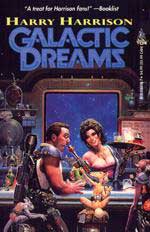 HH: HARRISON: Kind of, see I'd always been a SF fan, so, during my comic strip years I also illustrated some SF magazines which led me into the professional SF circle in New York. We all knew each other, it was great. Suddenly the guys who wrote for the pulps I read as a kid were now my friends; Cyril Kornbluth, Fred Pohl, Fletcher Prat, Frederick Brown, A.E. vanVogt, Robert Heinlein--the works! I had already written and sold some SF stories, in fact I sold my first story to editor Damon Knight and illustrated all 3 issues that were ever published of his magazine. I went into a writing frenzy and wrote for all the pulps; ASTOUNDING, GALALXY, FANTASY & SCIENCE FICTION, WORLDS BEYOND. I was essentially a freelance writer, writing everything from men's adventures, to romances, to true confession--anything that would sell. I then began editing for some of these magazines.
HH: HARRISON: Kind of, see I'd always been a SF fan, so, during my comic strip years I also illustrated some SF magazines which led me into the professional SF circle in New York. We all knew each other, it was great. Suddenly the guys who wrote for the pulps I read as a kid were now my friends; Cyril Kornbluth, Fred Pohl, Fletcher Prat, Frederick Brown, A.E. vanVogt, Robert Heinlein--the works! I had already written and sold some SF stories, in fact I sold my first story to editor Damon Knight and illustrated all 3 issues that were ever published of his magazine. I went into a writing frenzy and wrote for all the pulps; ASTOUNDING, GALALXY, FANTASY & SCIENCE FICTION, WORLDS BEYOND. I was essentially a freelance writer, writing everything from men's adventures, to romances, to true confession--anything that would sell. I then began editing for some of these magazines.
JG: EON: : So when were those energies focused into your first novel?
HH: HARRISON: I'd decided on what I would write my first novel about, but felt that NY was too hectic of a town for me to write anything lengthy in. I had to get out. Joan and I were married and had baby Todd who was a year old. After a career in dancing and dress designing, Joan wasn't charmed with the thought of being a housewife in the Village. I'd been stationed on the Mexican border during most of the war. I liked it, and it was cheap. When I suggested going there to write my novel, she said 'Let's go'. The year was 1956. The book was DEATHWORLD. Upon completion it sold as a serial to ASTOUNDING and almost won the Hugo award, only to come in second to Heinlein —--who always won. Who knows what would have happened if my book had been published in a different year.....
JG: I've always dug DEATHWORLD, and feel it has definitely withstood the test of time.
HH: Thanks.
JG: EON: : Before we move on, are there any comments you'd like to make about the authors you've encountered over the years?
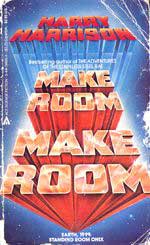 HH: HARRISON: They were a pretty crazy bunch at some points. Phil Dick [author of DO ANDROIDS DREAM OF ELECTRIC SHEEP? which was the basis for BLADE RUNNER] was an absolute madman, but a good friend. When he was manic, you had the greatest time. Except one time in particular... Once when on the depressive swing he actually threatened to kill me because I was chatting up a girl he had his eye on. And, I've gotta tell you, for a good hour or so, Phil was pretty serious about putting me 6 feet under! All ended well and he forgot about it.
HH: HARRISON: They were a pretty crazy bunch at some points. Phil Dick [author of DO ANDROIDS DREAM OF ELECTRIC SHEEP? which was the basis for BLADE RUNNER] was an absolute madman, but a good friend. When he was manic, you had the greatest time. Except one time in particular... Once when on the depressive swing he actually threatened to kill me because I was chatting up a girl he had his eye on. And, I've gotta tell you, for a good hour or so, Phil was pretty serious about putting me 6 feet under! All ended well and he forgot about it.
JG: EON: : You've spoken with me before about Isaac Asimov, any comments on him?
HH: HARRISON: Asimov was a great buddy, always in good cheer. Except one time when he was most depressed a year after he'd split up with his first wife. He never drank, so Gordy Dickson and I decided that he needed a good night of drinking to drown his sorrows. We failed on this mission. Isaac sat gloomily all night with an untouched sherry in front of him while Gordy and I got blasted out of our minds!
JG: EON: :That's a funny tale, I hadn't realized Asimov actually hated drinking.
HH: HARRISON: Well, there's kind of a happy end to it. He was forever grateful to me once I introduced him to Shirley Templess. It gave him the opportunity to carry around a drink at parties without people trying to force more on him. Actually, he was also a really good sport when I parodied his work in my novel BILL, THE GALACTIC HERO. He thought it was funny, and was always ok with it. I parodied Heinlein's work in that same book and he chose never to talk to me again.
JG: EON: : Can't win 'em all I guess. Let's talk about your latest work, STARS AND STRIPES FOREVER. It's book one of a trilogy, correct?
HH: HARRISON: Yes.
JG: EON: : You've had many of your works become trilogies or series. Do you realize at the beginning of the process that they will end up as such?
HH: HARRISON: I never really planned to write a trilogy/series. But, as an example, I did so much preliminary work on WEST OF EDEN, I had over 30,000 words of research before I sat down to write the book! I sent the first outline to my agent who told me, no way is this one novel. I disagreed. But, when I was half way through the book and was only about a 10th of the way through the outline I phoned him. The publisher was more than happy to change the contract to a trilogy. On TO THE STARS I did an immense amount of plotting . The editor said I had left out too much story to write just one book. I agreed and did a prequel to WHEELWORLD, called HOMEWORLD .and then a sequel entitled STARWORLD, just to tie the bundle up.
JG: EON: : What about my favorite, THE STAINLESS STEEL RAT?
HH: HARRISON: Another perfect example of not planning for it. THE STAINLESS STEEL RAT was a one-off, but, the character was fun and sold well, so I wrote a 2nd RAT book. Every few years I would come up with a RAT idea and would write it. The series began without my knowledge that it would end up as a series, it extended itself practically by accident. Speaking of the rat, I turned in THE STAINLESS STEEL RAT JOINS THE CIRCUS just a couple months ago. That's the 10th and probably the last title in that series.
JG: EON: :I'm sorry to hear that, as I truly love that series. To round out the question, what about STARS AND STRIPES FOREVER?
HH: HARRISON: That's probably the biggest example of all of this. The alternate history genre has so few good books in the field because of the immense research involved. Also because writers are lazy sods! You have to love the field you are writing about. I did about 30 years ofrs research on this book. I'm a Civil War buff and love to collect all the material. Half way through I used some of my material in another Civil War book, REBEL IN TIME then carried on with my current plot. When I turned in my outline to my agent it was so big he said it would never fit in one book. He also happened to mention that big outlines get big advances and he was right. So, in conclusion, I never ever planned to write a trilogy or a series, they just grew.
JG: EON: : I guess some of the best things can't be planned for.
HH: HARRISON: Exactly. This industry is always in a state of change and it's important to be ready to change with it. I'll give you an example. Up until recently all of my novels were in print in English. Now too many books are being published and backlists are a thing of the past. Yet, my books have always translated well and I have a good international following translated into 27 different languages. It's a good thing these venues were explored, as I'm now the most popular science fiction author in Russia.
JG: EON: : Really? What do you think fueled the sudden interest?
HH: HARRISON: Glasnost I guess and a more lenient free market economy. On average there are up to 100,000 copies of each of my novels in hardback! One of my novels even sold 600,000 in paperback!
JG: EON: : That's truly great. As we near the end of part one of our interview; Do you have any advice for writers in our audience who are beginning their careers?
HH: HARRISON: A young writer once asked me how he could join the old boys network in SF. I told him to write and sell an SF novel every year. If he did it for 40 years he would then be a member. But, alas they are dropping one by one. Right now I am writing my 43rd novel.
JG: EON: : I'd say you're definitely in the club.
HH: HARRISON: Indeed. In light of what we were just talking about, who knows how the industry will continue to change. Kingsley Amis once said that SF went from BEOWOLF to FINNEGAN'S WAKE in 40 years. I believe he was right. It went from the pulps in the 20's and 30's to the wild expansion into books in the 50's and 60's. Today it's splintering into heroic fantasy, future war, flying dragons, alternate history, and kiddy crap which is dumbing down the field.
JG: EON: : I agree. My final question to you would be how do you see science fiction literature surviving in the world of 24 hour television, videogames, the internet and as many as 5 new feature film releases a week?
HH: HARRISON: Not very well, in books that is. As a popular medium, it'll continue to hold its ground in television and film and is doing fine there now. Look, some SF novels can still be best-sellers, for the rest, it is a fight to get shelf space. Too many books are chasing too few slots. While SF sales might be up, sales for individual titles are down. "Pure" SF is fighting for its life next to 3 volume fantasies. The old adage of 'Crap sells best' has seen lots of light under current conditions. Unfortunately old science fiction writers are dying off and are not being replaced.
JG: EON: : Luckily we can still count on you and your works in the years to come. Harry, I know you're under deadline on your current book and I thank you for your time.
HH: HARRISON: My pleasure.
IN ISSUE 12.2 (posting JANUARY 22, 1999): Part 2 of the Harry Harrison interview which includes a discussion of Charlton Heston, Edward G. Robinson, SOYLENT GREEN and maybe even a little Esperanto!
ISSUE 12.0 - JANUARY 8, 1999